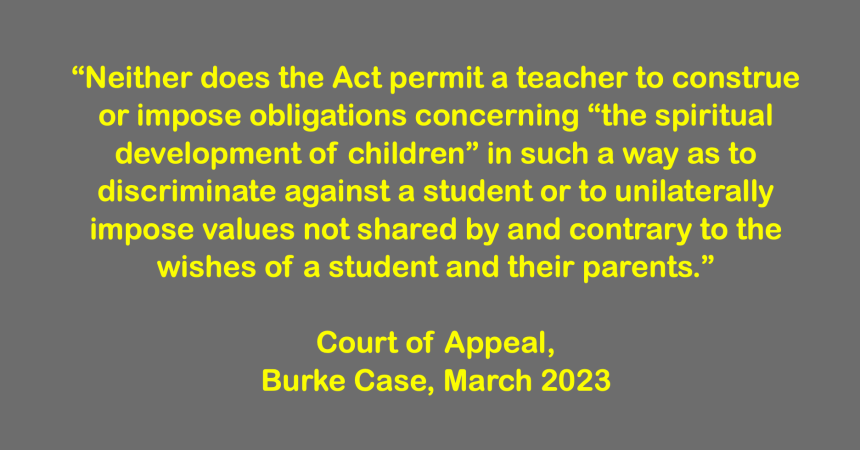
Schools cannot use Education Act to impose spiritual values on students, says Court of Appeal
The Court of Appeal in the Burke case has confirmed that schools and teachers cannot impose the values/ethos of the school on students, if those values are against the conscience of their parents.
Schools and Patron bodies believe that under Section 9 (d) of the Education Act they are legally responsible for the spiritual education of all students, and that they have a duty to ensure that all children receive a spiritual education. They all define the word ‘spiritual’ in the Act as ‘religious’ education when the definition of ‘spiritual’ under the Act is not confined to a belief in the transcendence.
Section 9 of the Education Act 1998 states that:
A recognised school shall provide education to students which is appropriate to their abilities and needs and, without prejudice to the generality of the foregoing, it shall use its available resources to
(d) promote the moral, spiritual, social and personal development of students and provide health education for them, in consultation with their parents, having regard to the characteristic spirit of the school,
The Court of Appeal has found under Section 9 – (d) of the Education Act 1998, teachers cannot use this section of the Education Act to impose their values on students if that is against the wishes of their parents.
Schools and teachers also use Section 9-(d) of the Education Act 1998 to control the choices of students who exercise their right to not attend religion classes. They tell students that they cannot do their homework or study if they exercise their Constitutional right to not attend religious instruction, because the school has a duty under Section 9 (d) of the Education Act 1998 in relation to their spiritual education. Some schools give students a list of books and a student must pick one of these or read a book in relation to their own faith.
Schools have absolutely no right to decide for parents what is or is not suitable spiritual education for their children. Nor have they any right to insist that students who exercise their constitutional right to not attend religion classes must study some type of spiritual education because the school has a duty in relation to their spiritual education. If a parent believes that studying or doing homework will help with the spiritual education of their child then the school has to respect this. The school should also be supervising students outside the religion class as that is their constitutional right and a condition of their funding.
Justice Whelan in the Court of Appeal in the Burke case in March this year stated that:
26. The focus of Mr. Burke’s preoccupation appears to have been ostensibly directed towards “the spiritual development of children”. That is, of course, one of the important factors specified in s. 9(d) of the Act. However, other consideration such as the moral, social and personal development of the student are equally relevant and encompass the need for mutual respect to be engendered as between teachers and students and between students inter se. Respect for equality, diversity, human dignity, inclusivity, tolerance and the safety, health mental and moral welfare of the particular student are not to be debased or reduced to nothing in the balancing exercise necessarily arising pursuant to the Act and were not addressed or engaged with at all by Mr Burke who, in effect, contends that they “were not relevant”… Neither does the Act permit a teacher to construe or impose obligations concerning “the spiritual development of children” in such a way as to discriminate against a student or to unilaterally impose values not shared by and contrary to the wishes of a student and their parents.
The reason why schools and teachers make up their own rules in relation to rights and legislation is because there are no statutory guidelines in place in relation to not attending religious instruction in schools. This is the duty of the Oireachtas under Article 44.2.4 of the Constitution and it is a duty they ignore.







0 Comments
No comments!
There are no comments yet, but you can be first to comment this article.